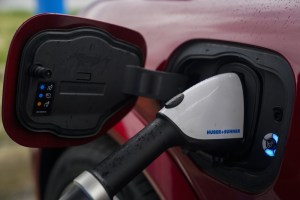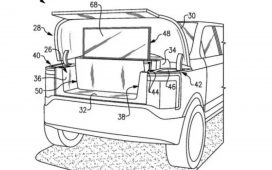Automakers across Europe and Asia are warning of a challenging year as rising costs and waning demand for electric vehicles weigh on profits.


A 2023 Ford Mustang Mach-E charges on Friday, March 8, at an electric vehicle charging station in London, Ohio. Automakers across Europe and Asia are warning of a challenging year as rising costs and waning demand for electric vehicles weigh on profits. Joshua A. Bickel/Associated Press file
Mercedes-Benz Group AG on Wednesday said it will sell combustion-engine cars longer than expected amid disappointing EV sales. Toyota Motor Corp., which sees operating income slumping by a fifth this fiscal year, is relying on hybrids to counter lower output. BMW AG, even as it’s doing better on EVs, flagged problems including higher manufacturing expenses.
Persistent inflation, muted economic growth in much of Europe and a protracted recovery in China – where excessive EV discounting is hurting manufacturers – are adding to the industry’s headaches.
“The price war in China is getting tougher every day,” Toyota Chief Financial Officer Yoichi Miyazaki said. “We’ll have to continue enduring for several years until we have more battery EVs to offer.”
Mercedes in April reported an earnings drop on model changeovers and soft EV demand, with Volkswagen AG and Stellantis NV also flagging slow starts to the year.
To be sure, most auto-industry companies confirmed their full-year guidance, with German parts maker Continental AG on Wednesday saying it expects earnings to improve in the second half due to price increases and cost-cutting. BMW’s EV sales jumped 28% in the first quarter after the German brand introduced a range of battery-powered models that look very similar to its gasoline models.
But many carmakers are feeling the pain of the EV slowdown after governments ended lucrative subsidies for the technology, making the already more expensive EVs even less attractive. Gaps in charging infrastructure also continue to turn off potential buyers.
“Some of our customers have delayed product launches in general, also in the new EV arena,” Continental CFO Katja Garcia Vila told Bloomberg in an interview by phone. “That caused delays in the ramp-up of our production.”
Mercedes Chief Executive Officer Ola Källenius told shareholders on Wednesday that the maker of the S-Class sedan will continue to make combustion-engine and hybrid vehicles “well into the 2030s” if demand is there.
Larger vehicles with combustion engines still command the biggest profits, with Ferrari NV and Porsche AG among those boasting the highest returns. And with China not phasing out sales of new combustion engines until 2060, luxury car makers still see potential for their legacy products in the world’s biggest auto market.
While the EV shift risks veering off course, carmakers aren’t making u-turns.
Toyota said it’s committed to EVs in the long term, and that it will invest an additional $3.2 billion in plans to decarbonize and develop next-generation software.
Ferrari, which on Tuesday reported underwhelming earnings and failed to raise its outlook, is building a factory in Italy to make hybrid and electric cars that will be ready next month. Both BMW and Mercedes plan to introduce a new generation of EVs with improved technology around mid-decade.
Demand for EVs “has slowed down a little bit, but it’s not the end of the world,” Thomas Schäfer, who heads Volkswagen’s namesake brand, said Wednesday at a conference organized by the Financial Times in London.
With assistance from Monica Raymunt.
Related Stories










Invalid username/password.
Please check your email to confirm and complete your registration.
Use the form below to reset your password. When you’ve submitted your account email, we will send an email with a reset code.